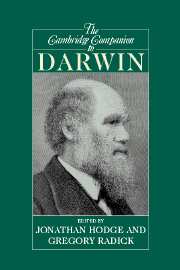Book contents
- Frontmatter
- Introduction
- PART I DARWIN’S THEORISING
- PART II HISTORICAL CONTEXTS
- PART III PHILOSOPHICAL THEMES
- 11 Metaphysical and epistemological issues in modern Darwinian theory
- 12 Darwinian concepts in the philosophy of mind
- 13 Darwinism in moral philosophy and social theory
- 14 Belief in God in a Darwinian age
- PART IV WAYS FORWARD
- Guide to further reading
- List of references
- Index
11 - Metaphysical and epistemological issues in modern Darwinian theory
from PART III - PHILOSOPHICAL THEMES
Published online by Cambridge University Press: 28 May 2006
- Frontmatter
- Introduction
- PART I DARWIN’S THEORISING
- PART II HISTORICAL CONTEXTS
- PART III PHILOSOPHICAL THEMES
- 11 Metaphysical and epistemological issues in modern Darwinian theory
- 12 Darwinian concepts in the philosophy of mind
- 13 Darwinism in moral philosophy and social theory
- 14 Belief in God in a Darwinian age
- PART IV WAYS FORWARD
- Guide to further reading
- List of references
- Index
Summary
A TWO-PART THEORY
Like Darwin's own theory of evolution, the modern Darwinian theory of evolution has two main elements:
The Tree of Life: All organisms now alive on earth trace back to a common ancestor.
;Natural Selection: Natural selection has been an important cause of the similarities and differences that exist in the earth's biota.
The first of these propositions says that any two contemporary organisms have a common ancestor. Human beings are genealogically related to each other, but each human being also has a common ancestor with chimps, dogs, clams, daffodils, bacteria and yeast. The second proposition, as I have formulated it, does not say that natural selection is the only cause of evolution. Indeed, it should be understood to leave open the possibility that there are traits for which natural selection is entirely irrelevant. This is the big picture, and evolutionary biology is devoted to filling in the details.
Although Darwinism is easy to describe, this simple theory gives rise to a rich range of metaphysical and epistemological questions. It is the purpose of this chapter to discuss some of them. In conformity with the structure of Darwinian theory, I have chosen one metaphysical and one epistemological problem from each of the two big ideas. I begin with a problem in the metaphysics of natural selection – the role of chance – followed by a problem in the metaphysics of the tree of life – the nature of a biological species. Turning from metaphysics to epistemology, the later sections of the chapter examine the testing of hypotheses about genealogical relatedness (the tree of life) and the testing of adaptive hypotheses (natural selection).
Information
- Type
- Chapter
- Information
- The Cambridge Companion to Darwin , pp. 267 - 287Publisher: Cambridge University PressPrint publication year: 2003
Accessibility standard: Unknown
Why this information is here
This section outlines the accessibility features of this content - including support for screen readers, full keyboard navigation and high-contrast display options. This may not be relevant for you.Accessibility Information
- 3
- Cited by
